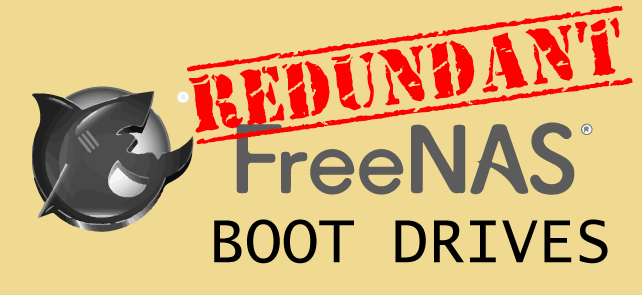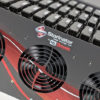Redundant FreeNAS Boot Drives on the Storinator!

At 45 Drives, the FreeNAS network attached storage operating system is a popular choice to run our high performance massive storage pods. It combines the advantages of the modern ZFS copy on write file system, with the simplicity of a purpose-built GUI driven NAS appliance shell.
Until today, whenever a customer received a Storinator running FreeNAS it would be configured with a bootable single USB stick that held the FreeNAS OS, and two SSDs configured as a backup of your FreeNAS configuration. In the unlikely event that the boot stick died, you simply had to plug in a new one (which could be created using the instructions and image on our wiki), and copy the configuration, and you’re up and going again.
But a number of customers requested that we ship our FreeNAS Storinator pods with a mirrored install of FreeNAS directly on the SSDs, and use the USB stick as the NAS configuration backup. I have to admit, it really did make a lot of sense to me, so we did it!
Essentially we are flipping the old setup upside down. Instead of a single install backing up to mirrored devices we have a mirrored install backing up to a single USB.
ADVANTAGES
We feel that this new set-up has a couple advantages over the old way.
- FreeNAS will boot faster.
- FreeNAS is quite verbose during its start up, and combined with the slow throughput of the USB stick, booting up the pod took ages compared to today’s world where SSD boot drives are taking over.
- FreeNAS is safer.
- FreeNAS is designed so that one boot SSD can fail while its mirror keeps you up and running. You simply pop in a new SSD, and once the mirror is rebuilt, you are protected again. So this gives you maximum uptime.
- PLUS your configuration is still being backed up! This could come in handy if you experience catastrophic failure of both SSDs, or the ever present risk of human error.
- For more info on the Configuration Backup, check out our wiki.
EXISTING CUSTOMERS
For existing customers running FreeNAS that want to use the new set up discussed here, have no fear, as you can switch over and be up and running like nothing happened in about 30 minutes!
The complete process will be outlined on our wiki: HERE.
But here’s a quick overview:
- Migrate all your config backups to somewhere not on the NAS, as we have to blow out the SSDs
- Follow our OS restoration procedure to install FreeNAS onto one of the SSDs.
- Plug in the freshly restored SSD the second SSD and the USB thumb drive. Ideally, get a separate USB stick than your current boot device just to be safe. It should be at least 4GB.
- Boot into FreeNAS, attach the second SSD to create a mirror and then create a pool called “backup” using the USB thumb drive.
- Import your storage pool(s) and then upload your old configuration.
- Get back to work!
Thank you for continually providing feedback on how we can improve our products for you, our customers. We take pride in listening to our customers, so if you have any other suggestions on how we can make our products more efficient for you, please don’t hesitate to send us an email!



